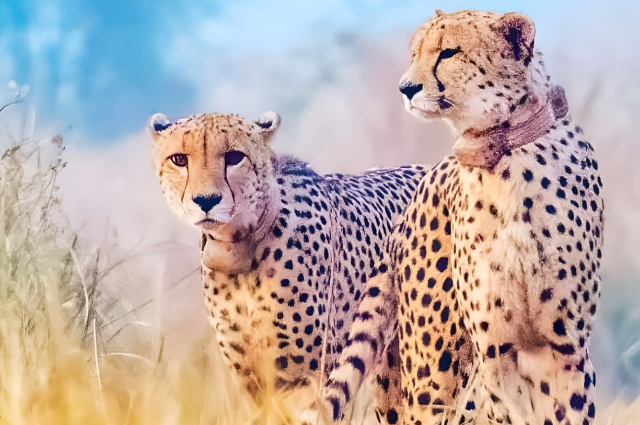In the collective memory of a nation, there exists a time when India's vast grasslands were living theatres where the cheetah, nature's most elegant speedster performed its ancient dance of survival. The year 1952 marked a milestone when the country officially acknowledged the cheetah's complete extinction from Indian territory. Seven decades of silence followed—a silence so profound that entire generations grew up never knowing the thrill of witnessing this magnificent creature in their own land.
But on October 1, 2025, that silence was shattered. Madhya Pradesh's Kuno National Park opened India's inaugural cheetah safari, offering an opportunity that seemed impossible just years ago: witnessing these magnificent animals roaming free in Indian wasteland once again. This represents not merely another tourist destination—it is an ecological revival, a bold attempt to correct a historical wrong.
From Dream to Reality: Project Cheetah's Audacious Journey
The story began with conservationists who refused to accept extinction as irreversible. Project Cheetah, launched between 2022 and 2023, brought carefully selected African cheetahs to India through a meticulously planned translocation programme. Each animal was chosen based on rigorous criteria: genetic diversity, physical health, behavioural traits, and, critically, its ability to adapt to India's unique ecological conditions.
The sceptics were many. Could animals evolved for African ecosystems truly thrive in Indian grasslands? Would they reproduce successfully? Three years later, the answers are cautiously optimistic. Multiple litters have been born at Kuno. Cubs have matured into independent adults, demonstrating natural behaviours and survival instincts. The cheetahs have begun exploring larger areas than projected, with approximately sixteen individuals currently calling Kuno home.
Challenges That Cannot Be Ignored
However, honesty demands acknowledging persistent obstacles. Early mortalities sparked intense debate within the conservation community. Questions about genetic diversity loom large—with a limited founder population, concerns about inbreeding are scientifically valid. The fundamental question of carrying capacity remains: how many cheetahs can Kuno realistically support long-term? These are practical challenges requiring solutions as the population hopefully grows.
A Safari Built on Respect
What distinguishes the Kuno cheetah safari is its underlying philosophy of respectful observation—a carefully calibrated balance between human access and animal autonomy. Safari excursions occur exclusively during early mornings and late afternoons when cheetahs naturally exhibit peak activity. Vehicle numbers are strictly controlled, with fixed routes and mandatory trained naturalist guides. Off-track trips are firmly prohibited.
Visitors are expected to observe with patience and reverence. To watch a cheetah stalk prey through tall grass, or witness family groups lounging in amber afternoon light. Some days visitors might see nothing at all, because wildness does not perform on demand. In exchange for this restraint, visitors receive something invaluable: an authentic encounter with wilderness, unscripted and honest.
Tourism Funding Conservation
Safari revenue flows directly back into conservation: habitat maintenance, prey population monitoring, veterinary services, and crucially, community outreach programmes. Conservation cannot succeed if imposed as an external burden—local communities must see tangible benefits through employment, infrastructure development, and compensation mechanisms.
Visitors bear responsibility too. Loud conversations, littering, and straying from paths are actively prevented. Every person entering Kuno signs an unspoken ecological contract: witnessing something extraordinary comes with the obligation to behave as a careful guest.
Planning Your Visit
The park has three entry gates: Tiktoli, Ahera, and Pipalbawdi, each operating on vehicle quotas with varying proximity to cheetah zones. A gypsy safari (up to six people) costs approximately Rs 4,500 per vehicle; private vehicle entry is around Rs 1,200. Bookings are made through the official Kuno National Park Safari Booking Portal or registered tour operators.
The forest department is developing Kuno Retreat for lodging and dining. Alternative accommodations range from eco-lodges near the park to premium stays in Gwalior and Kota, often packaging safari access into comprehensive experiences.
October through March is ideal—temperatures are moderate, vegetation thins for better visibility, and wildlife activity increases. Summer visits present challenges with harsh Central Indian heat taxing both visitors and animals.
The Visitor's Code
Wear muted-colored clothing and avoid strong scents. Bring binoculars or telephoto lenses for respectful observation. Maintain silence—no music, only hushed conversations. Follow naturalist guides' instructions without exception. Bring reusable water bottles and avoid all single-use plastics. Whatever enters the park must leave with visitors.
A Symbol of What Can Be Restored
To reduce this to tourism would misunderstand its significance. For over seven decades, the cheetah's absence reminded the nation of what India lost to development, hunting, and habitat destruction. Today, that narrative is being rewritten. The cheetah's presence demonstrates that with sufficient will, resources, scientific expertise, and patience, it is sometimes possible to undo previous damage.
This is India creating wildlife history. Madhya Pradesh has added another jewel to its conservation crown, with significant expected benefits for regional tourism and communities that have long borne conservation costs without enjoying its benefits.
Looking Forward with Cautious Optimism
Triumphalism must be resisted. Sixteen cheetahs do not constitute a recovered population—they represent a beginning. The coming years will be crucial. Continued reproductive success, genetic management, habitat expansion, human-wildlife conflict mitigation, and community engagement will determine whether Project Cheetah ultimately succeeds. But beginnings matter. They shift what seems possible, inspire further effort, and change the conversation from "they were lost" to "they are being brought back."
The inauguration of India's first cheetah safari is a statement about what the nation values and what it is willing to fight for. Visitors are not merely tourists—they are witnesses to history, participants in a grand experiment, stakeholders in an ongoing story whose ending remains unwritten. As visitors scan Kuno's grasslands at dawn for that distinctive spotted coat, the sight represents what was deemed impossible, a second chance that nature has granted. The cheetah has returned to India. The question now is: will the nation prove worthy of its return?
. . .
References:

